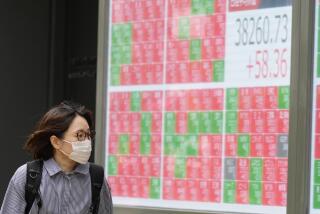Dow Off 22.58; Investors Await Jobless Figures : Market Overview
* Stock prices fell for the third day in a row as investors stepped aside to wait for today’s monthly unemployment figures.
* The Dow Jones average of 30 industrials fell 22.58 points to 2,889.09, the lowest level since May 17, when the index closed at 2,886.63.
Bond prices rose after Treasury Secretary Nicholas F. Brady suggested that the government may reduce its long-term borrowing.
Stocks
The stock market opened lower after another dispiriting report on employment. The Labor Department reported that 471,000 people filed new claims for unemployment benefits during the week ending Nov. 23, up 57,000 from the previous week. The department is to release the full month’s unemployment report today.
Declining issues outnumbered advances by 12 to 7 on the New York Stock Exchange. Big Board volume came to 166.35 million shares, down from Wednesday’s 187.96 million
The monthly unemployment report could set the stage for another round of interest-rate cuts.
“The general feeling is that we will see bearish (unemployment) numbers,” said Robert Walberg of MMS International. Economists expect a loss of 31,000 non-farm jobs and a rise in the jobless rate to 6.9% from 6.8% in October.
Traders said the jobs figures may determine the market’s next move.
“Everyone is pulling in their horns,” one trader said. “They’ve had a very good year, and no one is trying to be a hero.”
Gene Jay Seagle, director of technical analysis at Gruntal & Co., said, “There’s a general kind of melancholia settling over the marketplace in view of the amount of space (in the media) devoted to whether or not we are displaying an economic improvement.”
The NASDAQ over-the-counter index was down 1.25 to 534.03.
Among the market highlights:
* Boeing, which dropped 3 1/8 Wednesday, rebounded 3/4 to 42 1/8. First Boston repeated a buy rating, saying investors overreacted to comments by the company’s chief executive about aerospace business conditions.
* Upjohn slumped 1 5/8 to 38 3/8. Traders said Alex. Brown downgraded its rating on the drug maker to hold from buy.
* Intelligent Electronics continued to gain, rising 1 1/4 to 31. Merrill Lynch repeated a positive outlook on the company in a review of its fourth-quarter earnings report.
* Novell rose 1 1/2 to 56 1/2. Shearson said the company’s fourth-quarter results may be surprisingly strong.
* Lotus Development gained 2 to 20 3/4 after announcing an aggressive cost-cutting program, including a 10% staff reduction.
* Sanifill tumbled 7 1/8 to 14 1/2 after it said its 1992 results would likely be below analysts’ projections.
* T2 Medical advanced 1 1/2 to 50 1/4. Kidder Peabody reaffirmed its buy rating on the company.
* Royal Appliance jumped 3 1/4 to 42 1/4. Smith Barney repeated a buy rating on the company.
Overseas, Tokyo stocks closed lower, with the 225-share Nikkei average down 210.27 points to 22,459.17.
Shares also ended lower in London. The Financial Times 100-share average slipped 16.8 points to 2,407.0.
In Frankfurt, the DAX average closed at 1,553.42, down 7.54 points.
Credit
The Treasury’s 30-year bond closed up 1/16 point, or 63 cents per $1,000 in face amount. Its yield fell to 7.84% from 7.85% Wednesday. Short-term Treasury bills ended lower.
The government played down Brady’s remarks before the House Ways and Means Committee.
Brady said the Treasury was re-evaluating its borrowing habits. He suggested that it may issue fewer bonds with maturities of as much as 30 years in favor of short-term bills that mature in as little as three months.
“There’s been a lot of talk in the market about this lately,” said Frank Sannella, a Treasury market analyst with Stone & McCarthy Research Associates in Princeton, N.J. “Just to hear it out of the Treasury was enough to spark . . . some decent buying.”
A reduction in the supply of long-term bonds would increase prices. Conversely, a larger supply of short-term securities would push prices lower.
The federal funds rate, the interest on overnight loans between banks, rose to 4.688% from Wednesday’s 4.50%.
Currency
The dollar slumped on expectations that U.S. interest rates may continue to fall.
Traders said worries that interest rates may be heading lower and that today’s unemployment data will show more weakness kept pressure on the dollar. Falling rates make the dollar less attractive to foreign investors.
In New York, the dollar fell to 1.589 German marks from Tuesday’s 1.602 and to 128.70 Japanese yen from 129.10. The British pound was $1.797, up from $1.784 Wednesday.
Commodities
Natural gas futures prices plummeted on the New York Mercantile Exchange, reflecting warmer weather forecasts and the market’s repeated failure to sustain prices higher than $2.10 per 1,000 cubic feet.
Petroleum futures also fell, led by sharp losses in heating oil and gasoline.
On other commodity markets, precious metals rallied, livestock and meat futures retreated, and grains and soybeans were mixed.
Natural gas for delivery in January fell 5.9 cents to $2.024 per 1,000 cubic feet.
Light, sweet crude oil slipped 37 cents to $20.39 a barrel on the Merc.
Gold futures rose for a second day on New York’s Commodity Exchange. December gold rose $2.30 to $367.40 an ounce; December silver rose 2.2 cents to $4.026 an ounce.






